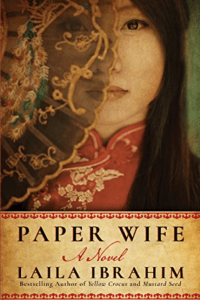Amanda Roberts's Blog, page 6
September 10, 2020
Mulan 2020: We Haven’t Come A Long Way, Baby
This post contains SPOILERS for the Disney live-action version of Mulan. Don’t scroll past Mushu if you don’t want to be spoiled.
In 1978, Edward Said wrote the book on Orientalism, which is the racist, simplistic, and inaccurate view of Eastern cultures in the West, especially in Western pop culture. My go-to example of Orientalism is the 1958 John Wayne film The Conquerer, where the Duke himself plays Ghengis Khan. Yes, you read that right. That might seem like an extreme outlier, but it wasn’t, and it still isn’t. Western films continue to portray Asians and Asian culture in stereotypical ways. The original cartoon version of Mulan has a few issues with this as well, and while Disney could have fixed those problems and made a beautiful, powerful film, they decided to double-down on their ignorance and make a film that hasn’t come very far from The Conquerer over sixty years ago.
But the Orientalism isn’t the only problem with this film. It’s just a bad film! In the very first scene, an eight-year-old Mulan uses Wuxia-type martial arts to scale her family’s Hakka roundhouse. She falls, but uses her “chi” to activate her Wuxia abilities to stop herself. There is so much wrong here! Director Niki Caro doesn’t show an ounce of interest in or understanding of Chinese history and culture throughout the film. Mulan is not Hakka. Wuxia is not innate. Chi is not a magical, masculine energy.
It only gets worse from there. I could really go scene by scene ripping this up, but I am trying to stick to the highlights.
Throughout the film, Mulan’s abilities are not defined. She is at once a Wuxia prodigy and a clutz. Her father tells her to “hide” her chi, but that isn’t why she’s clumsy. It’s not like she thinks, “oh I need to hide who I am and fall down,” she’s just clumsy. She’s a poor soldier because she hides her chi, not because she hasn’t been trained. In fact, she doesn’t need training when she shows up at the army camp. She’s apparently they best fighter of them all just because she’s Mulan. When she decides to stop hiding her chi, she’s just naturally great, which is stupid. Mulan isn’t a great character because she’s a “special chosen one.” She’s amazing because she’s just a girl who risked her life to save her father.
And this is a recurring problem throughout the film. It’s not moving. It’s not stirring. It doesn’t tug your heartstrings. We don’t even get a transformation scene. Mulan holds her father’s sword, then she’s in his armor, then her father tells her mother that he’s gone. There’s no STORY here about her making the decision to leave, stealing the armor, taking a long look at her family, and then riding off into the rain set to an epic film score. It’s just boring.
In the next scene, Mulan is “saved”, I guess, by a phoenix. This would make me less angry if the director hadn’t said in every. single. interview. that Mushu had been eliminated because a talking dragon wasn’t “realistic.” Seriously, I hate this director so much, I just can’t with her. But more than that, this is only about twenty minutes into the film. Mulan, as a character, hasn’t earned divine intervention yet, but here we are.
The character development for everyone is extremely poor. When she arrives at the camp, she has a negative and aggressive interaction with the love interest. Two scenes later, he wants to be her friend and offers her friendly advice. The general wants her to marry his daughter for some reason. And the Big Bad Guy also has Wuxia and he and all his men can walk up walls.
There’s also a shape-shifting witch, because that’s realistic, who’s only saving grace is that she is Gong Li, one of the most beautiful and talented actresses in the world. She actually seems to be the most well-rounded character in the film, and her affinity for Mulan makes some sense. But Mulan’s rejection of the witch and the witch’s willingness to sacrifice her life for Mulan are, again, not well developed and, thus, not very moving.
I have had reservations about this film for a year. The trailers and interviews with the director worried me greatly. But I had hoped that my fears were unfounded and that Disney–being no stranger to creating beautiful and moving films–would be better than the promotions made it seem. I wanted to love this film. Instead, all my fears came true and it was just as bad as I feared. It’s a white lady’s attempt at a Wuxia film–and that’s not a good thing
August 20, 2019
The Man in the Dragon Mask Trailer Premier!
I’ve never commissioned a book trailer before, but The Man in the Dragon Mask is the most ambitious book I’ve ever written, so I felt it deserved one. I am so grateful to Cherith Vaughan for her incedible trailer and beautiful book cover. She also did all the promotional materials for me. If you need a graphic artist (not just for book covers; I swear Cherith can do anything art related), be sure to contact her on her website or via her Facebook group.
About The Man in the Dragon Mask
One Face
Two Men
And A Secret That Could Destroy An Empire
At the dawn of the Ming Dynasty, the emperor will do anything to ensure the future of his empire. Building the Forbidden City in fulfillment of his father’s dreams is only the beginning.
But few people share the emperor’s vision.
When a consort’s betrayal has devastating consequences that rock the imperial court, the emperor discovers that the fight for the dragon throne has only begun.
Available from your favorite bookseller: https://books2read.com/u/meBerY
April 27, 2019
Don’t Miss The Child’s Curse – Exclusively in Cursed Lands
In a single moment, her life was no longer her own…
On the streets of Peking, Sparrow survives by picking pockets and stealing food from street vendors, until the day she touches an item that sends her hurtling through time, awakening a power in her she cannot control or understand.
Sparrow is forced to use her “trick” to tell fortunes, an endeavor that is exhausting at best, and deadly at worst. Every day becomes a nightmare that Sparrow is afraid she will never escape.
But then she catches the attention of the Empress herself. A woman of immeasurable cruelty and power—the woman with the ability to change Sparrow’s destiny forever…
Don’t miss The Child’s Curse, the exciting prequel to the Touching Time Trilogy, exclusively available in Cursed Lands!
[image error]
December 20, 2018
Book Review – Paper Wife by Laila Ibrahim
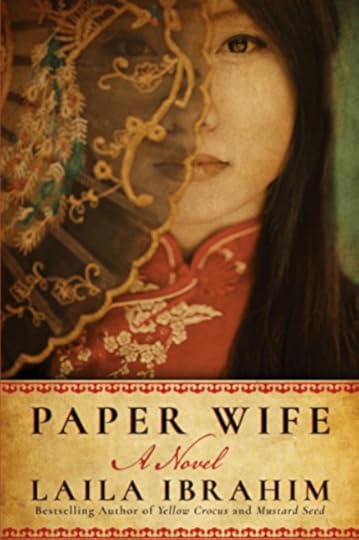
I recently did an interview with Laila Ibrahim, the author of Paper Wife, and she was kind enough to send me a copy of her novel to review. Be sure to check out her interview here!
About the novel:
Southern China, 1923. Desperate to secure her future, Mei Ling’s parents arrange a marriage to a widower in California. To enter the country, she must pretend to be her husband’s first wife—a paper wife.
On the perilous voyage, Mei Ling takes an orphan girl named Siew under her wing. Dreams of a better life in America give Mei Ling the strength to endure the treacherous journey and detainment on Angel Island. But when she finally reaches San Francisco, she’s met with a surprise. Her husband, Chinn Kai Li, is a houseboy, not the successful merchant he led her to believe.
Mei Ling is penniless, pregnant, and bound to a man she doesn’t know. Her fragile marriage is tested further when she discovers that Siew will likely be forced into prostitution. Desperate to rescue Siew, she must convince her husband that an orphan’s life is worth fighting for. Can Mei Ling find a way to make a real family—even if it’s built on a paper foundation?
My Review:
The novel was shorter than I expected. I read it in about two days, which is a rarity for me with my crazy life. But the story, while well-researched and interesting, is also rather simplistic. There are a lot of places the author could have added more information. Mei Ling only receives two letters from home and she never contacts the local shelter for women (in spite of a rather frightening letter she came across about it early in the novel).
The biggest issue with the novel though is that Mei Ling has no actual conflict in her life. Every “problem” she is faced with, she either solves or it is solved for her within a few pages. The person with the problem is Siew. The novel would have been much more compelling if Siew had been the main character. The largest conflict for Mei Ling comes at the last 10% of the novel, and, again, it is solved quickly and easily – and not under Mei Ling’s own steam. The novel had a lot of potential, but simply wasn’t developed enough for me.
Have you read Paper Wife? What did you think? Let me know in the comments.
The post Book Review – Paper Wife by Laila Ibrahim appeared first on Amanda Roberts Writes.
December 12, 2018
Book Review – In Order to Live by Yeonmi Park
I have been wanting to read Yeonmi Park’s memoir In Order to Live ever since I saw her speech about her escape from North Korea in 2014. Even though China is the main focus of my life and work, I have written before about how closely entwined the history of North Korea and China are. And, come to that, much Korean history is tied to America as well. Korea is a divided nation today because of the actions of America after WWII, so this is something I have worked to educate myself about. As such, I have read many memoirs by North Korean defectors. If you haven’t seen Park’s 2014 speech, I highly encourage you to do so now.
Even though I have read many other memoirs, In Order to Live was particularly interesting. Most memoirs are by authors who are a bit older, who survived the 1994-1998 famine. And indeed, that is when the first great mass exodus from North Korea began. But I think that many people assume that North Korea is “better” today, that there is more freedom, more jobs, and more food. Park fled North Korea in 2007, nearly a decade after the famine, and she was still starving to death. North Korea is just as bad today as it was twenty years ago.

What further makes Park’s memoir compelling is the harrowing story of what happened after she arrived in China. Instead of protecting refugees, China has a policy of returning North Korean defectors to North Korea, most of whom end up in concentration camps until they die. As such, most North Koreans in China suffer at the hands of traffickers, rapists, and others who would exploit them until they can find a way to escape to another country that will give them asylum and help them relocate to South Korea. But even past safe havens such as Mongolia or Cambodia are turning against South Koreans, returning them to China where they once again must live underground until they can try to escape again.
Park’s memoir, and many others like it, should be necessary reading for anyone who wants to know what is happening outside America’s borders, especially when refugees are such a hot topic in American politics today. Refugees aren’t coming for your jobs or to commit crimes or to live off your taxes. They are just doing whatever they can In Order to Live.
Have you read In Order to Live? Let me know what you thought in the comments.
The post Book Review – In Order to Live by Yeonmi Park appeared first on Amanda Roberts Writes.
December 1, 2018
Film Review: Crazy Rich Asians
Crazy Rich Asians, starring Constance Wu and Henry Golding, finally opened here in China on Friday, so my husband I saw it for our weekly date night. We loved it! It was so sweet and funny. I haven’t read the book by Kevin Kwan, but I really want to now. I wasn’t sure how much I would really like the movie because I don’t watch many romantic comedies or read much contemporary fiction, but it was really a fantastic movie. Here is a summary in case you aren’t familiar with the film.
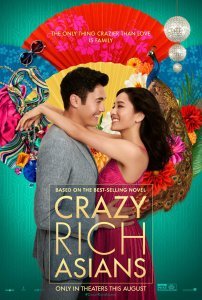 When New Yorker Rachel Chu agrees to spend the summer in Singapore with her boyfriend, Nicholas Young, she envisions a humble family home and quality time with the man she hopes to marry. But Nick has failed to give his girlfriend a few key details. One, that his childhood home looks like a palace; two, that he grew up riding in more private planes than cars; and three, that he just happens to be the country’s most eligible bachelor.
When New Yorker Rachel Chu agrees to spend the summer in Singapore with her boyfriend, Nicholas Young, she envisions a humble family home and quality time with the man she hopes to marry. But Nick has failed to give his girlfriend a few key details. One, that his childhood home looks like a palace; two, that he grew up riding in more private planes than cars; and three, that he just happens to be the country’s most eligible bachelor.
On Nick’s arm, Rachel may as well have a target on her back the second she steps off the plane, and soon, her relaxed vacation turns into an obstacle course of old money, new money, nosy relatives, and scheming social climbers.
Even though the movie has an exclusively Chinese cast and is set in Singapore, the plot is a tale as old as time. How can an outsider ever be good enough for one of the richest families in the world? The film definitely has a universal appeal.
I only wish I could have seen the film in a more packed theater. We live in a small town, so there was only one other couple in the theater with us, but they loved the film even more than we did. They were laughing and cheering and kissing and hugging and even crying at the very end. While the film appeals to anyone who loves a feel-good flick, the impact of this movie on not just Chinese-Americans but Chinese youths around the world cannot be overstated. A sequel is already rightfully in the works, and hopefully Hollywood is scrambling for more books about Chinese and Asian characters to adapt in the future.
Did you see Crazy Rich Asians? What did you think? Let me know in the comments.
The post Film Review: Crazy Rich Asians appeared first on Amanda Roberts Writes.
November 17, 2018
Two Americans in China is Moving!
No, we’re not moving, but the blog is. Since I became a serious author, I have been considering re-branding, and I ended up putting it off for far too long. The new website will be AmandaRobertsWrites.com, and you’ll still be able to find all the great China-related content you love, but I will also be sharing a lot more about our daily lives living and raising our children here in China, my books and the writing process, and a few surprises along the way. I hope you will keep following us and our journey!
The post Two Americans in China is Moving! appeared first on Two Americans in China.
September 21, 2018
Accessing Education for Children With Special Needs in China
Many children with special needs in China are denied educational opportunities because China’s public schools are literally inaccessible to children with physical disabilities and they don’t have the resources to support children with mental disabilities. It is an unfortunate fact that many Chinese families view their children as their support network as they age. If a child has any disadvantage that would hamper their ability to provide for their parents when they are adults, parents often have to make the heartwrenching decision to put the child up for adoption and try again. While many children with disabilities could still be productive adults capable or caring for their parents, that possibility becomes nearly impossible without access to education.
 Back to school fun!
Back to school fun!As an aside, this is a problem not just in China but worldwide, that people with disabilities earn less money than their able-bodied counterparts. In America, disabled people earn on average 68 cents for every dollar their non-disabled counterparts earn, while in the UK, disabled persons often earn as little a 40 cents on the dollar compared to non-disabled workers. Of course, in those countries, that is an employment issue. When it comes to education, both countries are much better at making sure all children – no matter their disability – have access to schooling. In China, when a child does not have access to education, the chance that the child will then be able to have a productive career is almost non-existent.
But there are even more hurdles for families in China trying to access education for their children. When the public schools are not an option, some families with the means will turn to private schools. These schools are usually much smaller with many more resources than public schools. And since they are for-profit, they generally will do whatever they can to accommodate families with special requests.
But sometimes those “special requests” clash when it comes to children with special needs – and there is significant prejudice and ignorance when it comes to children with special needs.
Our daughter has unique challenges, but we found a fantastic kindergarten in Yangshuo for her. The school’s principal used to work in the adoption field, so she really understands our daughter’s needs. The teachers are very kind and patient and go out of their way to make sure our daughter gets the most out of her classes. The classes are also very small, which has given our daughter the chance to improve her social skills in a way that is not overwhelming for her. It has been a wonderful experience and in the six months she has been going to school, she has made remarkable improvements.
But apparently, things were not going so smoothly behind the scenes.
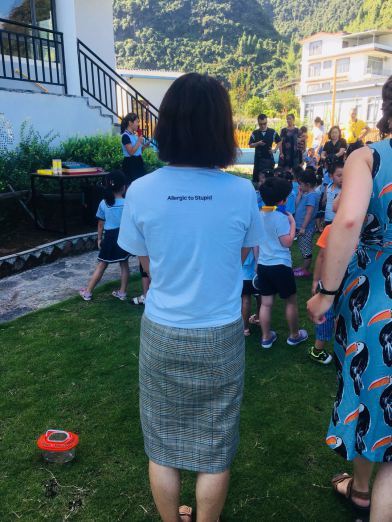 Our daughter’s principal is a secret badass.
Our daughter’s principal is a secret badass.The school’s principal told me yesterday that there is another mother with a daughter with special needs who would like to attend the school. Some of the other mothers found out about this and have vehemently objected to admitting the child, even going so far as to say that they will remove their children from the school if she is admitted. These mothers believe that the child with special needs will have a “negative effect” on their own children.
I was very surprised because our daughter has been attending for several months. The other mothers must see this and know that having a special needs child in a class does not hurt the other children. It is usually the other way around. The children who are more able are able to help the children who need the extra attention. I asked her if there was anything we could do to help. But that was when she dropped the bombshell.
“The other mothers don’t want your daughter to attend school here either.”
I am sure the shock and anger showed on my face because she was quick to tell me that we didn’t need to worry about it. She could handle the other mothers. The implication was that since we are foreigners, our daughter’s enrollment in the school is not up for debate. Even in a country where we are a significant minority, our white privilege is strong. But since the other mother is Chinese, the other mothers feel they have the right to bully her and her daughter out of the school.
I share stories like this to better exemplify the challenges parents in China face when their children have disabilities. Many times, even money cannot overcome prejudice and ignorance. It will take a drastic overhaul in both policy and attitudes before parents in China will be able to access quality education for their very special children.
The post Accessing Education for Children With Special Needs in China appeared first on Two Americans in China.
September 14, 2018
Interview with Laila Ibrahim, Author of Paper Wife
As soon as I read the description for Paper Wife, I knew it was exactly the kind of book I would love to read. It isn’t going to be released until the end of October, but author Laila Ibrahim was kind enough to do an author interview with me now. Read what she had to say below, and don’t forget to preorder your copy of Paper Wife!
From the bestselling author of Yellow Crocus comes a heart-wrenching story about finding strength in a new world.
Southern China, 1923. Desperate to secure her future, Mei Ling’s parents arrange a marriage to a widower in California. To enter the country, she must pretend to be her husband’s first wife—a paper wife.
On the perilous voyage, Mei Ling takes an orphan girl named Siew under her wing. Dreams of a better life in America give Mei Ling the strength to endure the treacherous journey and detainment on Angel Island. But when she finally reaches San Francisco, she’s met with a surprise. Her husband, Chinn Kai Li, is a houseboy, not the successful merchant he led her to believe.
Mei Ling is penniless, pregnant, and bound to a man she doesn’t know. Her fragile marriage is tested further when she discovers that Siew will likely be forced into prostitution. Desperate to rescue Siew, she must convince her husband that an orphan’s life is worth fighting for. Can Mei Ling find a way to make a real family—even if it’s built on a paper foundation?
AMAZON
Interview with Laila Ibrahim
1) Tell me a little about yourself, personally and as a writer.
My education and career have mostly been centered around families–as a religious educator, a preschool educator and as a birth doula. I’m still getting used to the idea that I am a professional writer. I’m thrilled that my stories resonate in people’s hearts and souls. I started writing in 2005 and haven’t looked back–though there were many bumps on the road at the beginning.
I live in Berkeley California in a small co-housing community. My wife is a public school educator, and it looks like our young adult daughters are following in her footsteps.
2) How did Paper Wife come about?
I have a family friend who once casually mentioned that she was in her mom’s uterus on Angel Island. I imagined there was an amazing story there but didn’t know I was the one to tell it. A few years later I visited the immigration detention center museum on Angel Island and I decided I had to tell that story someday. I stored that idea in the background. When I got a two-book deal from Lake Union for a companion to my first novel and then a second novel on anything I wanted I immediately knew Paper Wife would be the second book in that deal.
3) What kind of research was involved in bringing this book to life?
I’m fortunate to live so close to Angel Island and San Francisco Chinatown. I got to do a lot of research on location which really brought the feel of the experience alive. There are wonderful books that are first-hand accounts from the generation that went through Angel Island. I’m deeply indebted to the historians who did those interviews before that generation left this planet. The end of the book has a bibliography of the books and documentaries that I used.
4) What scene was the most difficult to write?
The beginning, when Mai Ling is leaving her family forever, is the most painful. I can’t fathom saying a forever goodbye to my family. I cried when I wrote it, and a cried each time I edited it.
5) What are you working on next?
I’ve just started a companion to Yellow Crocus and Mustard Seed. This third novel will follow the lives of characters introduced in those novels as they emigrate to California via the railroads in 1894. I’m researching the Pullman Porters, the PullmanStrike (which led to the establishment of Labor Day), and the suffrage movement in California. I like to show how historical events affect the lives of specific families.
The post Interview with Laila Ibrahim, Author of Paper Wife appeared first on Two Americans in China.
September 2, 2018
Guest Post: 8 Unique Things to See and Do in Beijing
There aren’t many places in the world like Beijing. This massive city has a unique mixture of ancient history and cutting-edge innovation. It will definitely leave an impression on you. While there are plenty of must-see things to do in and around Beijing, like the Great Wall or The Forbidden City, this post will highlight eight more unique places that are worth checking out.
798 Art District
 If you love art, you absolutely must visit the 798 Art District during your stay in Beijing. In the 1950s, this factory complex was originally named Joint Factory 718 and was designed as part of a Socialist Unification Plan between the People’s Republic of China and the Soviet Union. Between the late 1950s and the late 1980s, tens of thousands of factory workers lived and worked in Joint Factory 718 before it finally shuttered its doors in the early 1990s. Now, the former factory complex is known for its unique Bauhaus architectural style and is home to an incredible variety of galleries, art studios, restaurants, and bars. You could spend all day wandering in and out of different art exhibitions and stopping to eat at the district’s many trendy restaurants and cafes. This one-of-a-kind arts district is a must-see for any art enthusiast visiting Beijing.
If you love art, you absolutely must visit the 798 Art District during your stay in Beijing. In the 1950s, this factory complex was originally named Joint Factory 718 and was designed as part of a Socialist Unification Plan between the People’s Republic of China and the Soviet Union. Between the late 1950s and the late 1980s, tens of thousands of factory workers lived and worked in Joint Factory 718 before it finally shuttered its doors in the early 1990s. Now, the former factory complex is known for its unique Bauhaus architectural style and is home to an incredible variety of galleries, art studios, restaurants, and bars. You could spend all day wandering in and out of different art exhibitions and stopping to eat at the district’s many trendy restaurants and cafes. This one-of-a-kind arts district is a must-see for any art enthusiast visiting Beijing.
Happy Valley
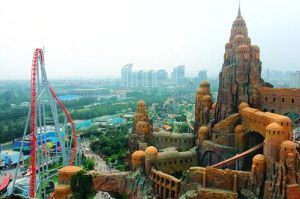 Happy Valley is a great place to visit for families with young children, or even just amusement park enthusiasts in general. This massive amusement park features six different areas, each with a different theme ranging from ancient Greece to Mayan culture to the mythical city of Shangri-La. It has forty rides in total, ten of which are extreme rides perfect for any adrenaline junkie or thrill-seeker. Even if you’re not into roller coasters, you’re sure to have fun catching a movie in Happy Valley’s IMAX theater or wandering around its extensive shopping center. You can also watch the Golden Mask Dynasty show at the park’s Overseas Chinese City Opera theater or visit the Living Art Museum exhibition. If you’re looking for a fun-filled excursion full of thrill rides, Happy Valley is the perfect place for you!
Happy Valley is a great place to visit for families with young children, or even just amusement park enthusiasts in general. This massive amusement park features six different areas, each with a different theme ranging from ancient Greece to Mayan culture to the mythical city of Shangri-La. It has forty rides in total, ten of which are extreme rides perfect for any adrenaline junkie or thrill-seeker. Even if you’re not into roller coasters, you’re sure to have fun catching a movie in Happy Valley’s IMAX theater or wandering around its extensive shopping center. You can also watch the Golden Mask Dynasty show at the park’s Overseas Chinese City Opera theater or visit the Living Art Museum exhibition. If you’re looking for a fun-filled excursion full of thrill rides, Happy Valley is the perfect place for you!
Wudaokou
Wudaokou, also known by many as Koreatown, is a neighborhood in northwest Beijing. This neighborhood in particular has a large population of students due to its proximity to several prestigious universities like Tsinghua University and Peking University. It also has a sizable Korean immigrant population, as evidenced by its “Koreatown” nickname. As a result of its diverse student population, which includes Chinese natives and foreign exchange students from all over Asia, Europe, and the US, Wudaokou is home to a wide variety of restaurants and cafes that serve all sorts of international food. It also has a notoriously vibrant nightlife and club scene, with different establishments catering to the clubbing preferences of students from different continents. If you love to party, definitely make sure to stop by Wudaokou!
CCTV Tower
CCTV Tower is the tallest building in Beijing, the third tallest building in China, and the sixth tallest building in the entire world. It’s named after China Central Television (CCTV), which is the number one TV network in China. There are a number of interesting attractions to visit inside the tower, including the largest open-air observation deck in the world, a pair of exhibits highlighting the history of CCTV and the traditional culture of Beijing, a rotating buffet-style restaurant, and an indoor aquarium and ocean park. If you want to get a birds-eye view of China’s capital, CCTV Tower is the best place to be. On a clear, cloudless day, you can see the Summer Palace, Tiananmen Square, and the Forbidden City from the observation deck.
Houhai
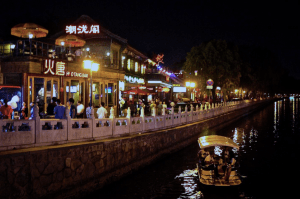 Houhai, which literally translates to “Rear Lake,” is a beautiful lake district in central Beijing. Houhai is well-known for its idyllic beauty and bustling nightlife. During the day, you can ride a pedal boat on the lake, stroll across the area’s many bridges, or even just sit on a bench and people-watch. Although its serene water and picturesque bridges are beautiful in the daylight, nighttime is really when Houhai comes alive. It’s home to a number of bars, restaurants, teahouses, and coffee shops that cater to Chinese natives and tourists alike. If you’re interested in history, you can visit the Former Residence of Soong Ching Ling, a museum dedicated to the former Vice President of the People’s Republic of China. You can also visit the Prince Gong Mansion, another museum that was the former residence of Qing dynasty statesman Prince Gong.
Houhai, which literally translates to “Rear Lake,” is a beautiful lake district in central Beijing. Houhai is well-known for its idyllic beauty and bustling nightlife. During the day, you can ride a pedal boat on the lake, stroll across the area’s many bridges, or even just sit on a bench and people-watch. Although its serene water and picturesque bridges are beautiful in the daylight, nighttime is really when Houhai comes alive. It’s home to a number of bars, restaurants, teahouses, and coffee shops that cater to Chinese natives and tourists alike. If you’re interested in history, you can visit the Former Residence of Soong Ching Ling, a museum dedicated to the former Vice President of the People’s Republic of China. You can also visit the Prince Gong Mansion, another museum that was the former residence of Qing dynasty statesman Prince Gong.
Nanluoguxiang Hutong
If you’re bored of shopping malls and retail centers, Nanluoguxiang is a breath of fresh air. Located in a series of narrow alleyways, or “hutongs,” this unique shopping area is full of interesting stores and food stalls. It’s a perfect place to hunt for unique souvenirs to bring home to your family and friends. It’s also home to the smallest bar in Beijing, measuring only 12 square meters, and also aptly named “12 Square Meters.” It’s a pedestrian-only area, which means you can wander around on foot without having to watch out for cars or buses. If your feet are tired, you can also hire a pedicab to drive you around the area or rent a bike and pedal around yourself. Nanluoguxiang is also an excellent place to take a peek at Beijing’s famed courtyard residences and Yuan Dynasty architecture.
Sanlitun
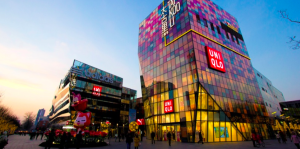 Sanlitun is a can’t-miss destination for any shopaholic. It’s a popular shopping and entertainment district full of malls, bars, restaurants, and a newly-constructed multiplex movie theater. In addition to housing internationally-known brands like Uniqlo, Apple, Rolex, and the world’s largest Adidas store, Sanlitun is also home to a bevy of unique boutiques, bookstores, vintage shops, and even a clothing market called Yashow Market, which is notable for selling counterfeit designer items. Whether you’re into luxury fashion, kitschy-cute clothing items, or unique vintage finds, Sanlitun has something for you!
Sanlitun is a can’t-miss destination for any shopaholic. It’s a popular shopping and entertainment district full of malls, bars, restaurants, and a newly-constructed multiplex movie theater. In addition to housing internationally-known brands like Uniqlo, Apple, Rolex, and the world’s largest Adidas store, Sanlitun is also home to a bevy of unique boutiques, bookstores, vintage shops, and even a clothing market called Yashow Market, which is notable for selling counterfeit designer items. Whether you’re into luxury fashion, kitschy-cute clothing items, or unique vintage finds, Sanlitun has something for you!
Ride around the city on a Mobike or Ofo
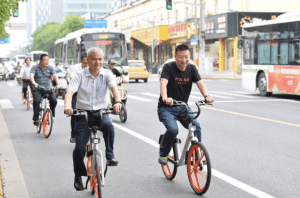 Mobike and Ofo are station-free bike-sharing companies originally native to Beijing. Using the Mobike or Ofo apps, you can connect your credit card, locate any eligible bicycles in the area, and scan and unlock a bicycle to ride around the city for however long you’d like. You may even already be familiar with these two bike-sharing services if you live in cities like Milan, London, Bangkok, Tel Aviv, Berlin, or Santiago. If you’re looking to get some exercise and boost your heart rate as you tour the city, Mobike and Ofo are excellent ways to get around!
Mobike and Ofo are station-free bike-sharing companies originally native to Beijing. Using the Mobike or Ofo apps, you can connect your credit card, locate any eligible bicycles in the area, and scan and unlock a bicycle to ride around the city for however long you’d like. You may even already be familiar with these two bike-sharing services if you live in cities like Milan, London, Bangkok, Tel Aviv, Berlin, or Santiago. If you’re looking to get some exercise and boost your heart rate as you tour the city, Mobike and Ofo are excellent ways to get around!
Nick Dahlhoff is an American English teacher living in Beijing. He writes a lot about learning Mandarin on his website – All Language Resources.
The post Guest Post: 8 Unique Things to See and Do in Beijing appeared first on Two Americans in China.

